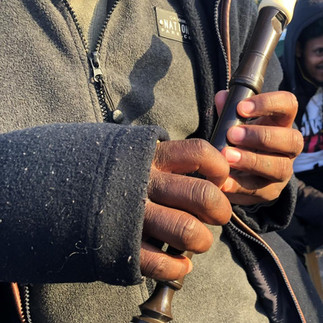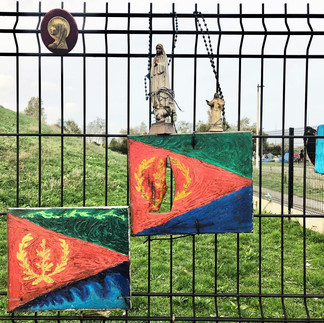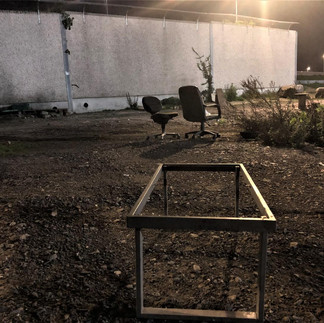DEAD WIRE – LIVE WIRE
- Art Refuge

- Nov 12, 2022
- 3 min read
Calais 11.11.22
We are privileged to share this latest reflection from Calais written by long term volunteer Alex Holmes. All names have been changed.
Eject - Expel – Clear – Remove – Oust – Boot Out. It all comes to the same thing: Rejection – ‘We do not want you here in Calais’. It is the norm; systematic. Expulsion from one of Calais’ refugee camps can be temporary, an every-two-day event to undermine, to unsettle, or it can be permanent, an expulsion followed soon after by the erection of high metal fencing and razor wire. Dead wire.
‘Green Hotel’, ‘Binto’, ‘Rue des Muettes’, Eritrean camps that have become lifeless zones, the human communities that brought vitality to these places cleared away. Less than a hundred metres from the fenced-off ‘Binto’, the bridge under which many Eritreans used to sleep, caught in the cross-glare of the football stadium lights and those along the ‘security wall’, the Stadium camp, for three years, the heartbeat of the Eritrean exiled community in Calais. Now it is empty; even the rats have gone. The residual paraphernalia of daily human life is scattered and aging. Black wood ash and rusting nails mark the site of the daily fire. On the makeshift shelf strapped to the fence sits a solitary blue mug and a near-empty jar of Maxwell House instant coffee. A silver shard from a broken looking glass lies on the frame of a metal ironing board; alongside it, the chrome lines of a coffee table mirror the rigid geometry of the nearby concrete ‘security wall’.
Soon, perhaps, the Stadium camp will be sealed off by fencing and wire. Dead wire. What the authorities kill off by their expulsions is life, humanity at its very best. Stripped back to essentials what emerges amongst the exiled communities pushed to the periphery of Calais is endless tenacity and courage, the warmest embrace of hospitality, a continual outflowing of love.
BMX camp. Live Wire. Wire strewn with drying clothes and blankets. Wire adorned with crosses and small statues and paintings of the Eritrean flag. Two sets of rosary beads click against the fence and swing in ever wider arcs with the rising wind; rain is coming. In preparation, the guys have erected a framework of pallets and strapped a tarpaulin to the framework and the wire. Beneath the tarpaulin, a homely domestic scene. Negisti is cooking injera on the fire, the large frying pan sitting on four tin cans. Russom is fingering his newly acquired recorder; gingerly putting it to his mouth he begins to play a tune. Keren is straightening a cigarette paper; with the few remaining flakes in his tobacco tin he rolls a nail-thin cigarette. Negisti’s two year old, Bisrat, pockets filled with peanuts, moves from person to person around the fire to gift or to deny them a single nut.
Heavy drops of rain begin to fall on the tarpaulin, a percussive addition to Russom on the recorder and the voice of Eritrean singer Semhar Yohannes coming from Meron’s phone. The guys grab a second tarpaulin to reinforce the first one and create a foil to the rain driving in horizontally. A second fire has been lit and onions sizzle in a big pan over the flames. Now the staccato drumming of the rain drowns out all other sounds. The tarpaulin balloons inwards with the weight of rainwater and has to be repeatedly pushed upwards to drain the water away. Other guys rush in to shelter. Sodden shoes and socks circle both fires in an attempt to get them dry. Hands and feet compete with the food for heat.
The downpour eases as dramatically as it began. Peering out from the tarpaulin into the evening light, Negus delights in a murmuration of starlings, a shape-shifting cloud that swoops and swirls above the willows. Russom is now DJ. His choice of music, ‘More than I Can Say’ by Leo Sayer. He first accompanies the song with his recorder, then in a second run, he sings along, word perfect, “I miss you every single day, why must my life be filled with sorrow, I love you more than I can say”. There is appreciation and banter; dinner is minutes away.
Alex Holmes



















Comments